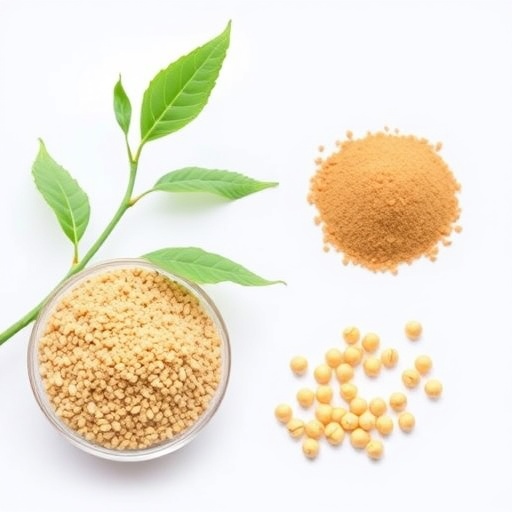
Recent research has spotlighted the potential of plant extracts in the realm of oncology, particularly their ability to act as adjuvant therapies in cancer treatment. A groundbreaking study published in BMC Complementary Medicine and Therapies has unveiled the remarkable properties of Cicer arietinum, commonly known as chickpea. Researchers A.A. Sayed and colleagues have demonstrated how this humble legume can serve as an antitumor agent and a protective compound against the aggressive Ehrlich Solid Carcinoma in laboratory mice. This revelation not only paves the way for new cancer therapies but also emphasizes the need for further exploration of phytotherapeutics in mainstream medicine.
Extracts from Cicer arietinum have gained attention due to their fascinating profile of bioactive compounds, which include antioxidants, flavonoids, and polyphenols. These ingredients are known for their role in enhancing the immune response and exhibiting anticancer properties. The study focused on the efficacy of chickpea extract in inhibiting tumor growth and metastasis in Ehrlich Solid Carcinoma-bearing mice, suggesting a multi-faceted approach to combat cancer. This adds a new layer of understanding regarding how dietary components can shift the paradigm of cancer treatment, merging nutritional science with medicinal applications.
At the laboratory, A.A. Sayed and the research team prepared various concentrations of Cicer arietinum extract and administered it to the cancer-bearing subjects. The study meticulously monitored the effects on tumor size, body weight, and overall survival rates. Their findings were promising, indicating not only a reduction in tumor size but also an improvement in the overall health status of the mice treated with the extract. This significant observation has implications far beyond just animal models; it opens a window into how dietary interventions might complement traditional chemotherapy regimens.
Chickpea extract’s mechanisms of action were investigated and found to involve the modulation of apoptotic pathways. The researchers engaged in comprehensive histopathological examinations that revealed substantial changes in tumor cellular architecture in response to treatment. This suggests that Cicer arietinum may induce programmed cell death in malignant cells, offering a natural alternative to conventional cytotoxic agents that often come with severe side effects. Such findings could address one of the pressing challenges in oncology: minimizing the adverse effects associated with traditional chemotherapy.
Furthermore, Cicer arietinum holds significant promise due to its relatively low toxicity profile. Many current cancer treatments can lead to debilitating symptoms due to their aggressive nature, which can limit patient compliance and overall quality of life. Chickpea extract, being dietary in origin, offers a gentler approach that could be used alongside existing methods without exacerbating adverse outcomes. This underscores the need for integrative oncology strategies that leverage the synergistic potential of food-derived compounds in treating cancer.
In addition to its tumor-inhibiting capabilities, the research also spotlighted the protective aspects of Cicer arietinum against the immunosuppressive effects typically seen in cancer patients. The study provided compelling evidence that the extract could help boost the immune response, potentially equipping the body with the tools to fend off malignancies and improve resilience. This finding is especially important in the context of evolving cancer therapies that emphasize not just fighting cancer but also enhancing the overall health of patients undergoing treatment.
The implications of this study are far-reaching. As doctors and researchers continue to confront the obstacles presented by cancer, integrating natural products into treatment regimens is becoming increasingly recognized as a promising strategy. This study provides a robust scientific foundation to support the use of Cicer arietinum as a viable adjunct therapy in managing Ehrlich Solid Carcinoma. As awareness grows regarding the connection between diet, health, and disease, practitioners may begin to see the incorporation of plant-based extracts as a standard part of comprehensive cancer care.
Moreover, the broad nutritional benefits offered by chickpeas cannot be overlooked. They are a rich source of protein, fiber, and essential vitamins and minerals that contribute to overall well-being. Thus, not only could Cicer arietinum serve as a therapeutic agent against cancer, but its inclusion in everyday diets can also promote health and prevent a range of diseases, demonstrating the timeless adage that food is indeed medicine.
Research in plant-based treatments for cancer continues to be a frontier of exploration. The efficacy of Cicer arietinum invites further studies to delineate its molecular mechanisms and to ascertain its full therapeutic potential. While this particular study offers remarkable insights, it also calls for rigorous clinical trials to translate findings from animal models to human applications. The journey from bench to bedside is essential in solidifying the role of chickpea extract in cancer therapies.
The growing body of evidence surrounding dietary interventions for chronic diseases has a cultural resonance, particularly in the context of rising global cancer rates. Public health initiatives that promote chickpea consumption, backed by scientific research, could foster greater awareness about nutritional choices’ role in cancer prevention. As people become more informed about their diets, the integration of powerful plant compounds into daily routines could play a pivotal role in shaping health outcomes.
In conclusion, the study on Cicer arietinum offers not only hope in the fight against cancer but also serves as a catalyst for expanding the realm of research into plant-based therapies. It reiterates the synergy between traditional medicine and modern scientific advancements, emphasizing the importance of exploring every avenue for tackling such complex diseases. The future of oncology may very well depend on our ability to harness nature’s bounty, and the evidence surrounding chickpeas is a monumental step in that direction.
The journey is still ongoing, as researchers delve deeper into the implications of these findings. The collaborative efforts in understanding plant-based interventions signal an exciting time in cancer research. As preliminary studies like this one unfold, there is optimism that a time will come where adjunct therapies derived from natural sources will find their rightful place alongside conventional treatments in oncology, making the world a healthier place for all.
Subject of Research: Cicer arietinum extract as an antitumor and protective agent against Ehrlich Solid Carcinoma-bearing mice.
Article Title: Cicer arietinum extract as antitumor and protective agent against Ehrlich Solid Carcinoma-bearing mice.
Article References:
Sayed, A.A., Abdullah, M.S., WalyEldeen, A.A. et al. Cicer arietinum extract as antitumor and protective agent against Ehrlich Solid Carcinoma-bearing mice. BMC Complement Med Ther 25, 325 (2025). https://doi.org/10.1186/s12906-025-05061-z
Image Credits: AI Generated
DOI: 10.1186/s12906-025-05061-z
Keywords: Cicer arietinum, chickpea extract, antitumor, protective agent, Ehrlich Solid Carcinoma, phytotherapy, cancer research, dietary interventions, plant-based medicine.
Tags: adjuvant therapies for cancerantioxidants and cancer preventionbioactive compounds in chickpeaschickpea extract antitumor propertiesCicer arietinum cancer treatmentEhrlich carcinoma therapyflavonoids in cancer therapyimmune response enhancementnutritional science and medicinephytotherapeutics in oncologyplant extracts in cancer researchtumor growth inhibition




